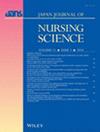Prediction models for the impact of the COVID-19 pandemic on research activities of Japanese nursing researchers using deep learning
Abstract
Aim
This study aimed to construct and evaluate prediction models using deep learning to explore the impact of attributes and lifestyle factors on research activities of nursing researchers during the COVID-19 pandemic.
Methods
A secondary data analysis was conducted from a cross-sectional online survey by the Japanese Society of Nursing Science at the inception of the COVID-19 pandemic. A total of 1089 respondents from nursing faculties were divided into a training dataset and a test dataset. We constructed two prediction models with the training dataset using artificial intelligence (AI) predictive analysis tools; motivation and time were used as predictor items for negative impact on research activities. Predictive factors were attributes, lifestyle, and predictor items for each other. The models' accuracy and internal validity were evaluated using an ordinal logistic regression analysis to assess goodness-of-fit; the test dataset was used to assess external validity. Predicted contributions by each factor were also calculated.
Results
The models' accuracy and goodness-of-fit were good. The prediction contribution analysis showed that no increase in research motivation and lack of increase in research time strongly influenced each other. Other factors that negatively influenced research motivation and research time were residing outside the special alert area and lecturer position and living with partner/spouse and associate professor position, respectively.
Conclusions
Deep learning is a research method enabling early prediction of unexpected events, suggesting new applicability in nursing science. To continue research activities during the COVID-19 pandemic and future contingencies, the research environment needs to be improved, workload corrected by position, and considered in terms of work-life balance.

 求助内容:
求助内容: 应助结果提醒方式:
应助结果提醒方式:


